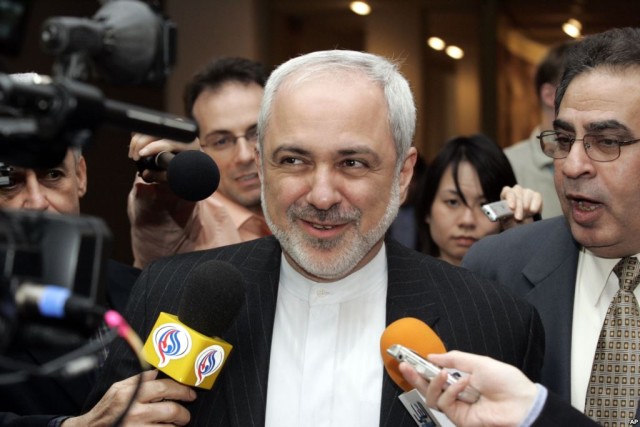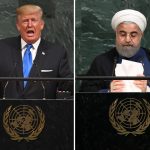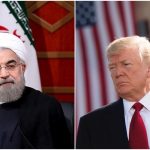by Jasmin Ramsey
“He may be the only person in the world who can telephone both Senator Dianne Feinsten and the Hezbollah Chief Hassan Nasrallah,” writes the veteran U.S. foreign affairs journalist Robin Wright about Iran’s famous foreign minister.
Her New Yorker profile is a fascinating read for anyone interested in Javad Zarif, whose mere smile so frightens the Israeli government and for those want to understand why Iran, faults and all, has been recently covered in American mainstream media as much more than — and perhaps not at all — a charter member of George W. Bush’s “axis of evil.”
We recently published an important piece by France’s former ambassador to Tehran, François Nicoullaud, who is probably more familiar with Iranian President Hassan Rouhani than with Zarif (Rouhani was Iran’s lead nuclear negotiator when Ambassador Nicoullaud was in Tehran). Nicoullaud’s post nonetheless made an important point related to Wright’s article:
One of [Rouhani’s] first acts as president was transferring Iran’s nuclear negotiating file from the Supreme National Security Council to the Ministry of Foreign Affairs. That enabled him to build a “dream team” of seasoned negotiators, perfectly comfortable with the codes and practices of their Western counterparts. Iran’s new and refined team has stood out in stark contrast to the collective clumsiness of the P5+1 negotiators, as in the early November 2013 episode, when four Wester foreign ministers rushed prematurely to Geneva, spurring the media to believe, mistakenly, that a deal would be signed. (It was signed 10 days later.)
The Iranian government hasn’t been remade since the June 2013 surprise election of Rouhani; it still contains hard-line and questionable cabinet picks by the president, such as Mostafa Pourmohammadi. But it’s hard to make a convincing argument today that Iran isn’t trying to change under Rouhani, who will mark his first anniversary as president in August.
That’s right, it hasn’t even been a year since that historic phone call between Rouhani and U.S. President Barack Obama last September in New York as the Iranian leader was being driven to JFK airport from the United Nations General Assembly where, in a furious series of meetings and speeches, he spelled out Iran’s new approach to the world.
Of course, Iran, which gives off a “striking impression” of “strategic loneliness” according to Wright, still has a long way to go on all fronts, and expectations are higher than ever.
Indeed, there has been considerable speculation about why the last round of nuclear negotiations between Iran and world powers ended in Vienna last Friday without the customary plenary. Al-Monitor’s Laura Rozen pointed to the “wide gaps” cited by a U.S. official, while the Guardian’s Julian Borger saw the parties hitting a wall. For his part, Zarif seemed as cool and collected as ever in his brief post-talks remarks. “Back from Vienna after tough discussions. Agreement is possible.But illusions need to go.Opportunity shouldn’t be missed again like in 2005,” he tweeted on May 17.
Whatever the reality of the situation (the negotiators have been remarkably disciplined about keeping the details of the talks under wraps), Rouhani needs a nuclear resolution. And as Wright’s profile shows, there may be no one in Iran better equipped or as determined as Zarif to achieve that goal. So can Zarif pull through? Stay tuned.





To Mike F, here you go again, with your arm chair analysis, as if you’re inside the heads of the Iranians. So, MEK, AIPAC, Netanyahoo, Israeli firster, Neocon bloger, paid PR flac, somewhere in between or all of the above, oh well, at least you like to point out everyones faults in their opinion[s], but not your own, which is what we call freedom of expression in the U.S.A.
Well, I can assure you I’m none of those, but I appreciate the attempt to wave your anti-Jewish credentials. Always refreshing to see the regime apologists are on the march.
Oh Mike F. You are so off base, but I’ll pass on your “holier than thou” attitude. If you can’t see the forest from the trees, what’s the sense in anything? Have a nice life.
If “holier than thou” means I stand against anti-Semitic comments, or anti-Christian hate, or anti-gay abuse or anti-women oppression, then I’ll gladly wear that flag thank you!
To Mike F
From many symptoms from the (iranian) field one may see that understanding iranian current negociations’ posture is by no mean looking at a machiavaelic calculation.Iranians ,again, have no choice.They cannot afford a strategy leading to keep significant nuclear military capabilities.They need their end-of-month cheque.This looks too simple for those used to assess sophisticated iranian strategies.But this is a fact.
They (iranians) may have wished to keep thanks to clever and even unscrupulous manoeuvres their military nuclear potential but they cannot afford it.Now,with intense IAEA’s monitoring, it is near impossible to build a consistent nuclear military program even if relying upon hidden unnoticed facilities.There are certainly unknown places where iranian scientists,experts,technicians,are working hard.But this will not be enough for keeping the necessary huge industrial process.Too late for everybody.Too late for iranians,but as well too late for the West.For sure iranian scientists have the technical knowledge for such a program.But they will be unable to keep it active up to final completion.Being a nuclear military power requires not only having one or several bombs at hand,but to be able to launch it through proper missiles ( upgraded North Corean ones) ,and,more critically,to be able to have it properly guided up to the target ( the most difficult job).Such a programme needs as well a final step :testing.India and Pakistan have tested their capabilities.And,finally, to be able to deal with the unavoidable massive reprisals.A set of cumulative conditions which cannot be met by Tehran.Therefore Tehran has no choice but to negociate.